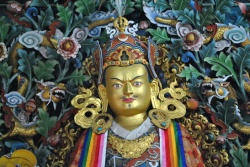Difference between revisions of "Eternalism"
| Line 1: | Line 1: | ||
[[File:Anc.jpg|thumb|250px|]] | [[File:Anc.jpg|thumb|250px|]] | ||
| − | [[Eternalism]] ([[rtag lta]]). The [[belief]] that there is a [[permanent]] and [[causeless]] creator of everything; in particular, that one's [[Wikipedia:Identity (social science)|identity]] or [[consciousness]] has a concrete [[essence]] which is {{Wiki|independent}}, everlasting and singular. | + | [[Eternalism]] ([[rtag lta]]). The [[belief]] that there is a [[permanent]] and [[causeless]] creator of everything; in particular, that one's [[Wikipedia:Identity (social science)|identity]] or [[consciousness]] has a concrete [[essence]] which is {{Wiki|independent}}, everlasting and singular. [[equanimity]]: One of the [[seven limbs of enlightenment]] and one of the [[Four Limitless States of Mind]]. |
| + | |||
| + | See; “[[upeksha]].” | ||
'''[[Eternalism]]''' (Skt. ''[[nitya dṛṣṭi]]''; [[Wyl.]] ''[[rtag pa'i lta ba]]'' or Skt. ''[[nityānta]]''; [[Wyl.]] ''[[rtag pa'i mtha]]<nowiki>'</nowiki>'') — one of the so-called '[[two extremes]]', [[eternalism]] is the [[belief]] that there is a [[permanent]] and [[causeless]] creator of everything; in particular, that one's [[Wikipedia:Identity (social science)|identity]] or [[consciousness]] has a concrete [[essence]] which is {{Wiki|independent}}, everlasting and singular. | '''[[Eternalism]]''' (Skt. ''[[nitya dṛṣṭi]]''; [[Wyl.]] ''[[rtag pa'i lta ba]]'' or Skt. ''[[nityānta]]''; [[Wyl.]] ''[[rtag pa'i mtha]]<nowiki>'</nowiki>'') — one of the so-called '[[two extremes]]', [[eternalism]] is the [[belief]] that there is a [[permanent]] and [[causeless]] creator of everything; in particular, that one's [[Wikipedia:Identity (social science)|identity]] or [[consciousness]] has a concrete [[essence]] which is {{Wiki|independent}}, everlasting and singular. | ||
Revision as of 16:29, 30 March 2014
Eternalism (rtag lta). The belief that there is a permanent and causeless creator of everything; in particular, that one's identity or consciousness has a concrete essence which is independent, everlasting and singular. equanimity: One of the seven limbs of enlightenment and one of the Four Limitless States of Mind.
See; “upeksha.”
Eternalism (Skt. nitya dṛṣṭi; Wyl. rtag pa'i lta ba or Skt. nityānta; Wyl. rtag pa'i mtha') — one of the so-called 'two extremes', eternalism is the belief that there is a permanent and causeless creator of everything; in particular, that one's identity or consciousness has a concrete essence which is independent, everlasting and singular.
There are many different brands of eternalism; they can be classified into three hundred sixty views, sixty-two false positions, eleven systems, and so on. All can, however, be condensed into the five tarka, or speculative systems.[1]
Alternative Translations
- Absolutism (Geshe Thupten Jinpa)
- Permanence (Dharmachakra Translation Committee)
Notes
- ↑ Mipham Rinpoche - Shantarakshita, The Adornment of the Middle Way: Shantarakshita's Madhyamakalankara with Commentary by Jamgon Mipham, Translated by Padmkara Translation Group (Boston: Shambhala, 2005), p. 217.
